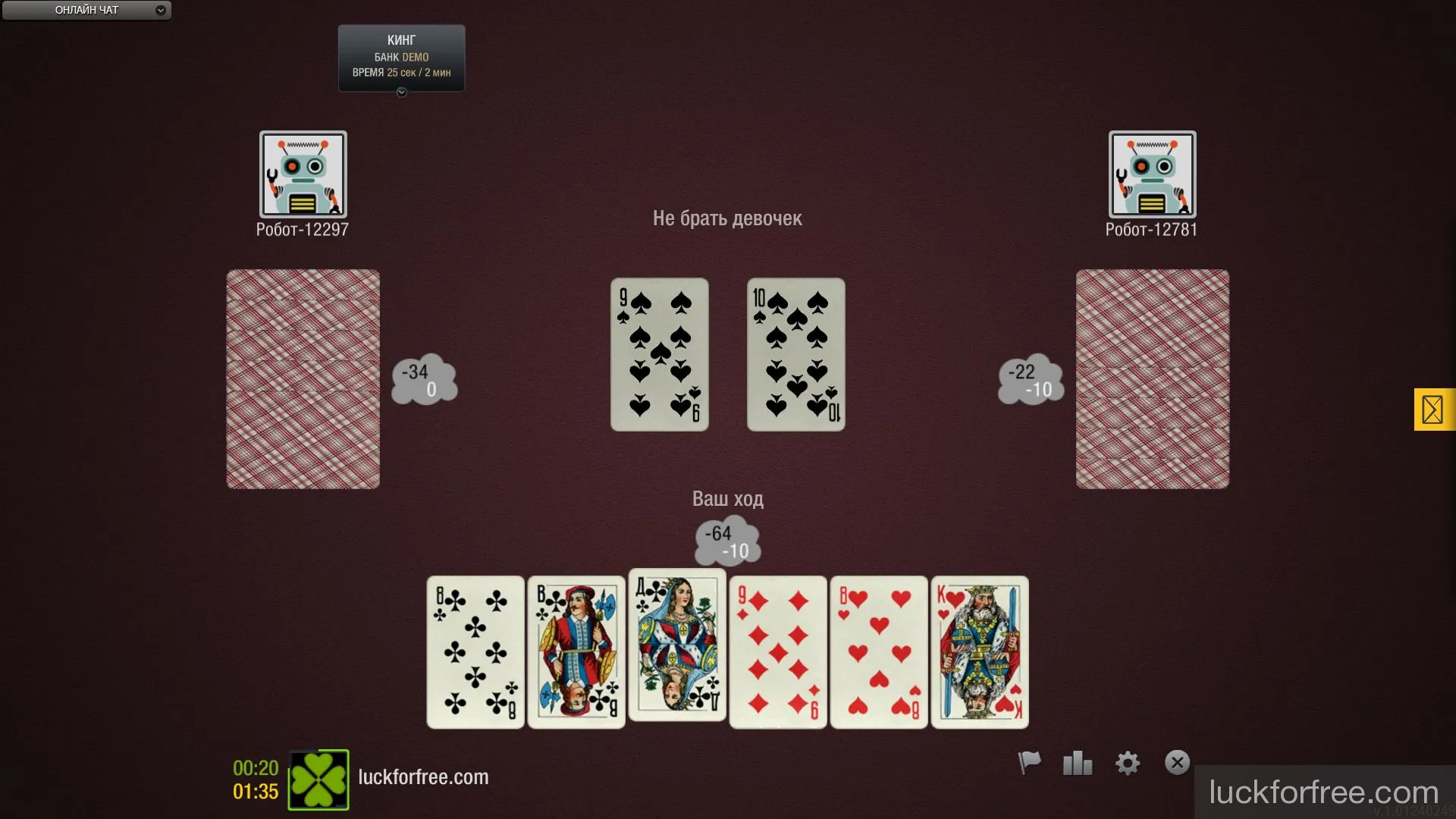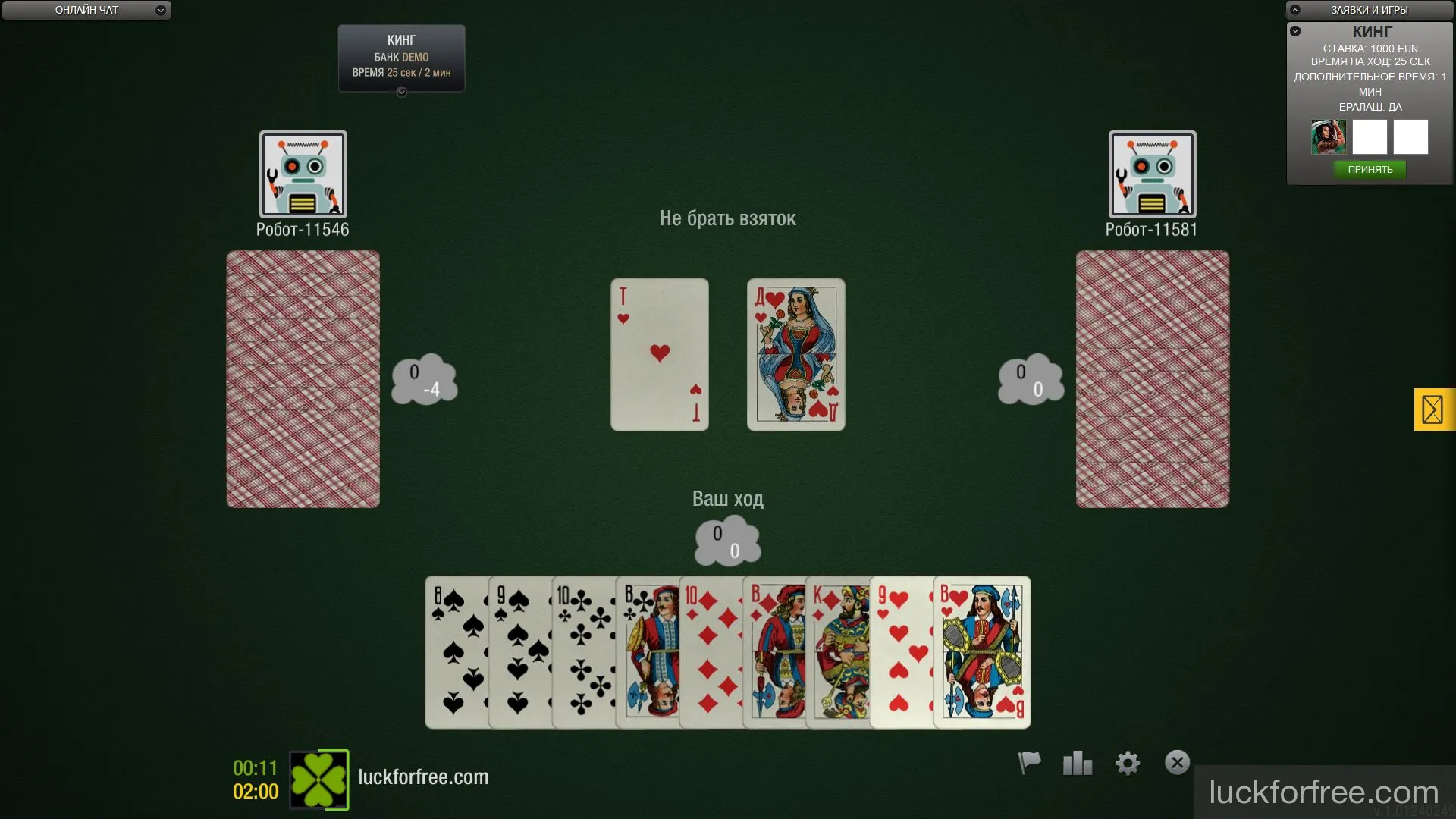The card game King can be considered a simplified version of Preference. The game is based on tricks, but you must not only take them - sometimes you have to skillfully avoid them. To win, you need to think strategically, calculate moves, remember discarded cards, and watch your opponents. A bit of luck also helps. Despite its apparent simplicity, King is an excellent intellectual pastime, just like any other strategy-based card game. The online format has made it accessible to everyone without the need to gather around a physical table.
The Card Game King: History and Origin
Many people know what “King” means - it’s a simple English word meaning “monarch” or “ruler,” which perfectly reflects the spirit of this game, as it’s centered around the key card, the King of Hearts, which greatly influences the outcome. The uniqueness of King lies in its varied rounds, each with its own objectives. However, the core principle always remains the same - first, avoid penalties, and then collect as many points as possible in the second half of the game.
The origins of the game go back to medieval Europe, where card games were an essential part of court life. Players competed not only in scoring points but also in avoiding certain combinations - a task that required both luck and tactical thinking. King quickly gained popularity among nobles and intellectuals, earning its place in the history of card games and eventually spreading beyond the aristocratic circles.
Card games have always reflected the culture of their time. It is believed that the King of Hearts was inspired by historical figures, though no one knows exactly who it represents. The tradition of depicting famous rulers and heroes on cards extended to many card games, including King, giving them a distinctive historical flavor.
In the modern era, King has been revitalized through digital technology. Online versions make it easy to join a game anytime, anywhere, and to compete with players from around the world. This accessibility allows players to improve their skills, test new strategies, and learn from others. Online platforms have created active King communities where fans can find worthy opponents and like-minded players for another exciting match.

Tips for Beginners in King
To improve as a player, it’s important to understand common mistakes and how to avoid them. One of the most frequent is inattention to the changing round conditions. Beginners often forget that the objectives of each round vary - sometimes you should avoid tricks, not collect them. Another common mistake is misjudging your hand’s potential. You need to know when to discard small cards and when to save strong ones, as well as how to take or avoid tricks to direct the game in your favor.
Winning in King depends on your ability to predict your opponents’ moves and remember the cards in play. Build your strategy several moves ahead. If you plan your game well from the start, you’ll eventually succeed. Pay attention to the round’s conditions and to the cards that have already been played, and analyze which ones your opponents may still hold. Get rid of penalty cards early in the round or save valuable cards that bring points until the right moment.
There are several proven ways to improve your King gameplay. The simplest - and most effective - is practice. Every round is different, so play regularly, analyze your mistakes, and learn from them. It’s also helpful to study replays of experienced players, participate in strategy discussions, and practice with different opponents. Over time, this will sharpen your memory, focus, and intuition, helping you master the game’s nuances.
How to Play King
To understand which cards are important and how to use them to your advantage, you must first learn the rules. A full game consists of two stages - the Penalty Phase and the Scoring Phase. Each contains 7 rounds with unique trick-taking conditions. In the first phase, tricks cost you points, while in the second, they earn you points.
During the Penalty Phase, you must avoid taking:
- any tricks at all;
- hearts;
- “boys” - jacks;
- “girls” - queens;
- the King of Hearts;
- the last two tricks;
- “Nothing” or “Mixed” - where all previous penalties apply simultaneously.
In the Scoring Phase, the same conditions apply, but in reverse - now you must take tricks that match these requirements to gain points.
How to Play King with Three Players
King is traditionally played by three or four players. With four players, the game uses a 32-card deck (from 7 to Ace), and each player gets 8 cards. For three players, two sevens - clubs and spades - are removed, and each player gets 10 cards. That’s the only difference; all other rules remain the same.
The first player is chosen randomly, and turns proceed clockwise. The trick goes to the player who played the highest card of the leading suit. Players must follow suit if possible; if not, they may play any card. The game has three main stages, ending with the final scoring phase, where the player with the highest total wins. In the online version, scoring and phase transitions happen automatically, freeing players from tedious bookkeeping and letting them focus entirely on the game.
Success in a three-player game depends largely on how well you distribute your cards across phases, predict opponents’ actions, and adjust your tactics in time. Remember that with three players, everyone holds more cards, requiring more careful planning.

How to Play King with Two Players
The two-player version of King uses an even smaller deck so that all cards can be dealt. For this mode, 16 cards are used - from Jack to Ace - also known as “face cards.” Each player gets 8 cards. The rules remain the same since all conditions revolve around these cards; lower values are simply omitted.
The game proceeds as usual: one player leads, the other responds, and the trick goes to whoever played the higher card. That player receives positive or negative points depending on the round’s conditions. Suit-following rules still apply - if the defending player has a card of the same suit, they must play it; otherwise, they can discard any card. Cards are redealt each round, and points are tallied at the end.
The compact deck doesn’t make the game less interesting - in fact, it demands more careful planning. You must track played cards closely and anticipate your opponent’s hand. Properly timing your strongest cards across rounds becomes crucial for consistent success.


